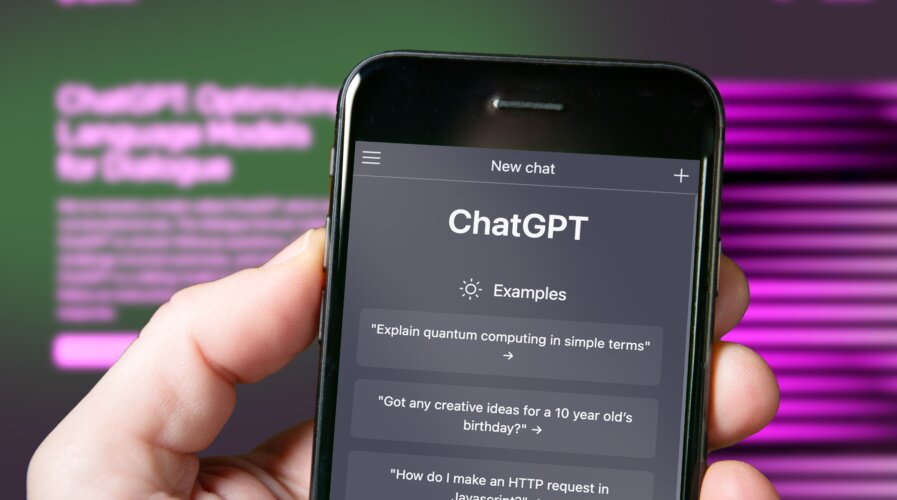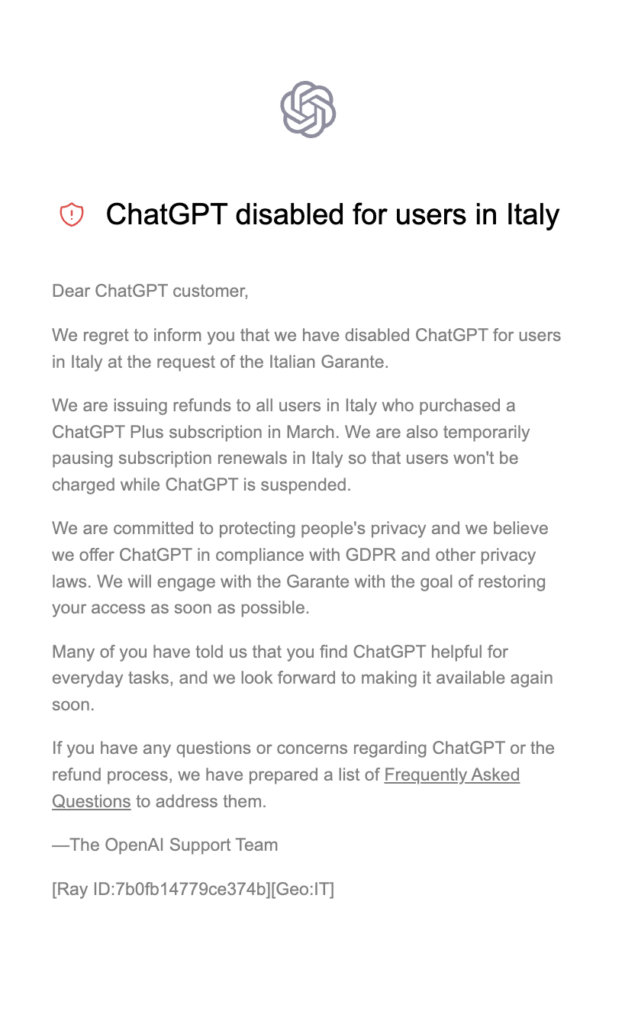
The ban on ChatGPT in Italy signals a far more significant concern in Europe – and perhaps other countriesSource: Shutterstock
Has Italy’s ban on ChatGPT opened Pandora’s box for the future of AI regulation worldwide?
- Italy recently became the first Western country to ban ChatGPT as the Italian Data Protection Watchdog ordered OpenAI to temporarily cease processing Italian users’ data amid a probe into a suspected breach of Europe’s strict privacy regulations.
- Various governments are exploring how to regulate AI, with some even considering joining Italy in banning the technology.
On March 31, Italy’s data watchdog – the Italian Data Protection Authority – issued a temporary emergency decision demanding OpenAI to stop using millions of Italians’ personal information included in its training data. The ban was enough for the world to know that this may be the beginning of the regulatory woes ChatGPT could potentially face.
According to the regulator, OpenAI has no legal right to use people’s personal information in ChatGPT. In a statement that appears online to users with an Italian IP address, OpenAI said it “regrets” to inform users that it has disabled access to users in Italy — at the “request” of the data protection authority.
That means OpenAI will have to respond to the officials investigating possible breaches of the European Union’s General Data Protection Regulation (GDPR). Based on GDPR, OpenAI, backed by Microsoft, risks facing a fine of 20 million euros (us$21.8 million), or 4% of its global annual revenue, if it doesn’t come up with remedies to the situation in 20 days.
OpenAI said it would also issue refunds to all users in Italy who bought the ChatGPT Plus subscription service last month — and notes, too, that it is “temporarily pausing” subscription renewals there so that users won’t be charged while the service is suspended. “We are committed to protecting people’s privacy and believe we offer ChatGPT in compliance with GDPR and other privacy laws.”

OpenAI “regrets” to inform users that it has disabled access to users in Italy — at the “request” of the data protection authority.
The company said it would engage with the Garante to restore access immediately. “Many of you have told us that you find ChatGPT helpful for everyday tasks, and we look forward to making it available again soon,” OpenAI added in its statement to users following the ban of ChatGPT in Italy.
The first ChatGPT ban, but will more follow suit?
While the action by Italy may be the first taken against ChatGPT by a Western regulator, other European countries have indicated similar concerns days following the temporary ban on ChatGPT. The report suggests that France, Germany, and Ireland have contacted the Italian Data Protection Authority, locally known as Garante, to ask for more information on its findings.
We of course defer to the Italian government and have ceased offering ChatGPT in Italy (though we think we are following all privacy laws).
Italy is one of my favorite countries and I look forward to visiting again soon!
— Sam Altman (@sama) March 31, 2023
All in all, the wave of inquiries in Europe signals privacy tensions around creating giant generative AI models, often trained on vast swathes of internet data. An article by Wired quoted Tobias Judin, the head of international at Norway’s data protection authority, stating that “if the business model has just been to scrape the internet for whatever you could find, then there might be a significant issue here.
Jubin, according to Wired, adds that if a model is built on data that may be unlawfully collected, it raises questions about whether anyone can use the tools legally. Judin also noted that the Italian decision highlights more immediate concerns. “Essentially, we’re seeing that AI development to date could potentially have a massive shortcoming,” Judin added.
Before Italy’s ban came to light, there were growing calls for regulating AI. In fact, on March 22, an open letter signed by hundreds of prominent AI experts, tech leaders, and scientists called for a pause on the development and testing of AI technologies more powerful than OpenAI’s language model GPT-4 so that the risks it may pose can be adequately studied.
Even governments are finding it challenging to keep up, considering the pace at which technology has progressed. The UK, for instance, announced plans for regulating AI. Rather than establish new regulations, the government asked regulators in different sectors to apply existing rules to AI. Although the proposal by the UK doesn’t mention ChatGPT by name, it outlines some fundamental principles for companies to follow when using AI in their products, including safety, transparency, fairness, accountability, and contestability.
Meanwhile, US President Joe Biden also commented that it remains to be seen whether AI is dangerous, but underscored that technology companies had a responsibility to ensure their products were safe before making them public. In a report by Reuters, Biden told science and technology advisers that AI could help in addressing disease and climate change, but it was also important to address potential risks to society, national security and the economy.
For now, Italy’s ban on ChatGPT seems to have opened Pandora’s box on AI regulations globally. What is certain is that we can expect to hear more governments discussing the need to regulate AI chatbots like ChatGPT.
Perhaps Elon Musk’s call to pause AI innovations has a point after all.
READ MORE
- Ethical AI: The renewed importance of safeguarding data and customer privacy in Generative AI applications
- How Japan balances AI-driven opportunities with cybersecurity needs
- Deploying SASE: Benchmarking your approach
- Insurance everywhere all at once: the digital transformation of the APAC insurance industry
- Google parent Alphabet eyes HubSpot: A potential acquisition shaping the future of CRM


